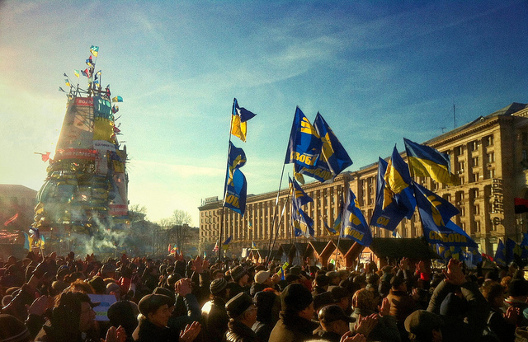 Ukraine’s political crisis approaches the New Year holiday (and the Christian Orthodox Christmas on January 7) in an emerging deadlock. At least for now.
Ukraine’s political crisis approaches the New Year holiday (and the Christian Orthodox Christmas on January 7) in an emerging deadlock. At least for now.
President Viktor Yanukovych, reinvigorated by his December 17 cash infusion from Russia, shows signs of having decided to tough it out and play for the long haul. Russia’s offer of $15 billion in loans, plus a significant discount in the price of imported gas, give Yanukovych an opportunity to heed moderates in his own camp who favor economic reforms and conciliation with the massed protesters demanding a closer relationship with Europe.
But a step that Yanukovych announced last week in the direction of conciliation – a roundtable conference for negotiations among government, opposition and protest leaders – quickly stalled in a calculated set of deliberate slights and missteps. These included the participation of a youth activist from Yanukovych’s ruling Party of Regions as the representative of protesting students, and the absence of any expressions of a concrete willingness by Yanukovych to seek a middle ground on protester demands for new legislative elections and a reconfigured government.
Today, Yanukovych signed an amnesty for innocent protesters arrested in the violence that flared in late November. This putatively conciliatory gesture, however, was accompanied by new criminal investigations of activists whom authorities suspect of having participated in the seizure of government buildings or having denigrated the president by marching with his portrait held upside down.
The month-old protest movement in Kyiv has continued to show remarkable staying power. Sunday’s crowd at the capital’s Maidan Nezalezhnosti (Independence Square) numbered well over 200,000. Equally encouraging in the past week was the absence of violent altercations and the police keeping a polite distance.
Early in the crisis, the Party of Regions sought to compete with the protest movement by holding its own counter-demonstrations to support Yanukovych. But the pro-government crowds never showed the size, energy or emotion of their opponents and now the party, appearing exhausted by the effort, has declared an end to its effort to show public support in the streets. Moreover, the party is showing strong discontent within its ranks and among the oligarchs who back it. For the moment, the government is managing to use intense pressure to stifle parliamentarians and businessmen who have discussed defection from the ruling majority or shown signs of political disloyalty.
A New Civic Movement
Importantly, the emergence of Ukraine’s mass protest movement has injected new life into Ukraine’s politics and the masses of demonstrators have become a source for the recruitment of a new generation of civic activists. One sign of this trend was the creation Sunday of a national civic movement to be known as Maidan. Its leadership includes leaders from the main opposition parties, plus a significant cohort of public intellectuals, educators, artists, and civic activists who have led the demonstrations.
The new organization aims to register millions of members as a core of a structured, ongoing protest movement that could potentially become a national political force as March 2015 presidential elections near.
The organization’s name, Maidan, means “square” in Ukrainian and comes with an interesting etymology. It is an Arabic word for an open square or ground that also is found in Turkish, Urdu, and Persian. Indeed, Cairo’s Tahrir Square – the site of the Egyptian mass protests that ended the 30-year rule of President Hosni Mubarak – is known in Arabic as Midan at-Tahrir.
Putin’s Tightening Embrace
A week after Russia announced its aid package to keep Ukraine’s government and economy afloat, Russian President Vladimir Putin is rapidly building a complex minefield of business relationships that can severely constrain Ukraine’s current and future leaders, no matter of what stripe.
While all the motives for his generous bailout of Yanukovch are not yet clear – and some of the bailout’s additional codicils still unknown – one trend is obvious: President Putin seeks to enmesh Ukraine in a web of long-term economic relationships that will be hard to disentangle even if Ukraine eventually opts for free trade with Europe.
As part of this strategy, Russia is likely to take a major stake in Ukraine’s Gas Transport System, which moves Russian gas to Europe. Such participation will complicate Ukraine’s current adherence to the European Energy Charter which places limits on monopolization and requires transparency in gas transactions.
The coming months also are likely to see a boom in Russian investment in Ukraine’s aerospace, shipbuilding, and military armaments industries. Such investment makes a great deal of sense to Putin, who seeks to modernize his country’s fleet and weapons systems and can do so with greater efficiency by using Ukraine’s dormant military-industrial infrastructure and inexpensive but skilled workforce.
Putin is therefore striking two birds with one stone: shoring up Yanukovych and Ukraine’s economy before the country’s 2015 presidential elections, and ensuring a major Russian economic presence (and influence) in Ukraine whether or not Yanukovych or a future leader opts for association with the European Union.
Image: Kyiv, Ukraine December 22 (Photo: Flickr/Mykhailo Liapin(Grocap)/CC License)
